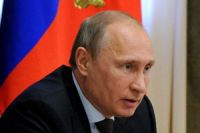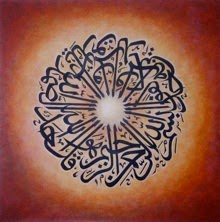
 |
The unipolar model of the world order has failed. - Vladimir Putin, St Petersburg, May 22 |
Russia’s President Vladimir Putin says the world should not be dominated by one power as the United States’ “unipolar” vision of the world has failed.
According to Press TV, Putin made the remarks on Friday during an economic forum in Saint Petersburg, adding that today’s world people want to decide on their fate themselves.
The Russian leader also said West’s imposed sanctions on Russia over the Ukraine crisis would have a boomerang effect, noting that the west’s anti-Russia measures will impact Western economies.
Furthermore, Putin commented on Ukraine’s upcoming presidential election on May 25, saying Moscow would respect the result of the vote.
The Russian president voiced hope that Kiev would halt its military operation against pro-Russia activists in the eastern Ukraine.
The interim Kiev government has been staging military operations in the eastern and southern regions since mid-April in a bid to root out pro-Russia protests. The military offensive has left nearly 130 people dead, according to the United Nations.
>>http://www.islamicinvitationturkey.com/ <<
 |
| GARDEN IN SOCHI, Painting by Arshile Gorky STORY by Pepe Escobar The future visible in St Petersburg |
Then, on Thursday, most of the main players were at the St Petersburg International Economic Forum - the Russian answer to Davos. And on Friday, Russian President Vladimir Putin, fresh from his Shanghai triumph, addressed the participants and brought the house down.
It will take time to appraise last week's whirlwind in all its complex implications. Here are some of the St Petersburg highlights, in some detail. Were there fewer Western CEOs in town because the Obama administration pressured them - as part of the "isolate Russia" policy? Not many less; Goldman Sachs and Morgan Stanley may have snubbed it, but Europeans who matter came, saw, talked and pledged to keep doing business.
And most of all, Asians were ubiquitous. Consider this as yet another chapter of China's counterpunch to US President Barack Obama's Asian tour in April, which was widely described as the "China containment tour". [1]
On the first day at the St Petersburg forum I attended this crucial session on Russia-China strategic economic partnership. Pay close attention: the roadmap is all there. As Chinese Vice President Li Yuanchao describes it: "We plan to combine the program for the development of Russia's Far East and the strategy for the development of Northeast China into an integrated concept."
That was just one instance of the fast-emerging Eurasia coalition bound to challenge the "indispensable" exceptionalists to the core. Comparisons to the Sino-Soviet pact are infantile. The putsch in Ukraine - part of Washington's pivot to "contain" Russia - just served to accelerate Russia's pivot to Asia, which sooner or late would become inevitable.
It all starts in Sichuan
In St Petersburg, from session to session and in selected conversations, what I saw were some crucial building blocks of the Chinese New Silk Road(s), whose ultimate aim is to unite, via trade and commerce, no less than China, Russia and Germany.
For Washington, this is beyond anathema. The response has been to peddle a couple of deals which, in thesis, would guarantee American monopoly of two-thirds of global commerce; the Trans-Pacific Partnership (TPP) - which was essentially rebuked by key Asians such as Japan and Malaysia during Obama's trip - and the even more problematic Trans-Atlantic Partnership with the EU, which average Europeans absolutely abhor (see Breaking bad in southern NATOstan, Asia Times Online, April 15, 2014). Both deals are being negotiated in secret and are profitable essentially for US multinational corporations.
For Asia, China instead proposes a Free Trade Area of Asia-Pacific; after all, it is already the largest trading partner of the 10-member Association of Southeast Asian Nations (ASEAN).
And for Europe, Beijing proposes an extension of the railway that in only 12 days links Chengdu, the capital of Sichuan, to Lodz in Poland, crossing Kazakhstan, Russia and Belarus. The total deal is the Chongqing-Xinjiang-Europe network, with a final stop in Duisburg, Germany. No wonder this is bound to become the most important commercial route in the world. [2]
There's more. One day before the clinching of the Russia-China gas deal, President Xi Jinping called for no less than a new Asian security cooperation architecture, including of course Russia and Iran and excluding the US. [3] Somehow echoing Putin, Xi described NATO as a Cold War relic.
And guess who was at the announcement in Shanghai, apart from the Central Asian "stans": Iraqi Prime Minister Nouri al-Maliki, Afghan President Hamid Karzai and crucially, Iranian President Hassan Rouhani.
The facts on the ground speak for themselves. China is buying at least half of Iraq's oil production - and is investing heavily in its energy infrastructure. China has invested heavily in Afghanistan's mining industry - especially lithium and cobalt. And obviously both China and Russia keep doing business in Iran. [4]
So this is what Washington gets for over a decade of wars, incessant bullying, nasty sanctions and trillions of misspent dollars.
No wonder the most fascinating session I attended in St Petersburg was on the commercial and economic possibilities around the expansion of the Shanghai Cooperation Organization (SCO), whose guest of honor was none other than Li Yuanchao. I was arguably the only Westerner in the room, surrounded by a sea of Chinese and Central Asians.
The SCO is gearing up to become something way beyond a sort of counterpart to NATO, focusing mostly on terrorism and fighting drug trafficking. It wants to do major business. Iran, India, Pakistan, Afghanistan and Mongolia are observers, and sooner rather than later will be accepted as full members.
Once again that's Eurasian integration in action. The branching out of the New Silk Road(s) is inevitable; and that spells out, in practice, closer integration with Afghanistan (minerals) and Iran (energy).
The new Crimea boom
St Petersburg also made it clear how China wants to finance an array of projects in Crimea, whose waters, by the way, boasting untold, still unexplored, energy wealth, are now Russian property. Projects include a crucial bridge across the Kerch Strait to connect Crimea to mainland Russia; expansion of Crimean ports; solar power plants; and even manufacturing special economic zones (SEZs). Moscow could not but interpret it as Beijing's endorsement of the annexation of Crimea.
As for Ukraine, it might as well, as Putin remarked in St Petersburg, pay its bills. [5] And as for the European Union, at least outgoing president of the European Commission Jose Manuel Barroso understood the obvious: antagonizing Russia is not exactly a winning strategy.
Dmitry Trenin, director of the Carnegie Moscow Center, has been one of those informed few advising the West about it, to no avail: "Russia and China are likely to cooperate even more closely ... Such an outcome would certainly benefit China, but it will give Russia a chance to withstand US geopolitical pressure, compensate for the EU's coming energy re-orientation, develop Siberia and the Far East, and link itself to the Asia-Pacific region." [6]
On the (silk) road again
The now symbiotic China-Russia strategic alliance - with the possibility of extending towards Iran [7] - is the fundamental fact on the ground in the young 21st century. It will extrapolate across the BRICS, the Shanghai Cooperation Organization, the Collective Security Treaty Organization and the Non-Aligned Movement.
Of course the usual shills will keep peddling that the only possible future is one led by a "benign" empire. [8] As if billions of people across the real world - even informed Atlanticists - would be gullible enough to buy it. Still, unipolarity may be dead, but the world, sadly, is encumbered with its corpse. The corpse, according to the new Obama doctrine, is now "empowering partners".
To paraphrase Dylan ("I left Rome and landed in Brussels"), I left St Petersburg and landed in Rome, to follow yet another episode in the slow decadence of Europe - the parliamentary elections. But before that, I was fortunate to experience an aesthetic illumination. I visited a virtually deserted Institute of Oriental Manuscripts of the Russian Academy of Sciences, where two dedicated, extremely knowledgeable researchers gave me a private tour of some pieces belonging to arguably the most outstanding collection of Asian manuscripts on the planet. As a serial Silk Road traveler fanatic, I had heard about many of those documents, but I had never actually seen them. So there I was, on the banks of the Neva, a kid in a (historical) candy store, immersed in all those marvels from Dunhuang to Mongolia, in Vedic or Sanskrit, dreaming of Silk Roads past and future. I could stay there forever.
Notes: 1. China Thwarts U.S. 'Containment' With Vietnam Oil Rig Standoff, Forbes, May 8, 2014.
2. Le president chinois appelle la Chine et l'Allemagne - construire la ceinture economique de la Route de la Soie (in French), Xinhua, March 30, 2014.
3. China calls for new Asian security structure, Washington Post, May 21, 2014.
4. Russia plans to build up to eight new nuclear reactors in Iran, Reuters, May 22, 2014.
5. Naftogaz Debt to Gazprom Stands at $4 Bln - EU Energy Commissioner, Ria Novosti, May 28, 2014.
6. See here.
7. China, Iran and Russia: Restructuring the global order, Al Jazeera, May 20, 2014.
8. In Defense of Empire, The Atlantic, March 19, 2014.
Pepe Escobar is the author of Globalistan: How the Globalized World is Dissolving into Liquid War (Nimble Books, 2007), Red Zone Blues: a snapshot of Baghdad during the surge (Nimble Books, 2007), and Obama does Globalistan (Nimble Books, 2009).
He may be reached at pepeasia@yahoo.com.
(Copyright 2014 Asia Times Online (Holdings) Ltd. All rights reserved. Please contact us about sales, syndication and republishing.)
Central Asia
May 29, '14
http://www.atimes.com/atimes/Central_Asia/CEN-01-290514.html
THE ROVING EYE



Selling the world on how to enslave all the world, and then the world decides that the world is greater than the few criminally insane human/s? AND the world decides with the sanest leaders that can stand as great an army as NAZI NATO and not be killed by the criminally insane. Wanting every human to purchase debt to live in earth, while this monster sells the toxic everything to destroy all life, isn't acceptable to the billions and we decide.
ReplyDeleteGoldman Sachs and JP Morgan Chase don't go to St. Petersburg because they were outsmarted. Thought all people could be enslaved in debt, sold China and Russia on the sinister Agenda 21, and worse. Now we know how the true top chess players play. New World Order is Multi-Polar and thankfully.
ReplyDelete